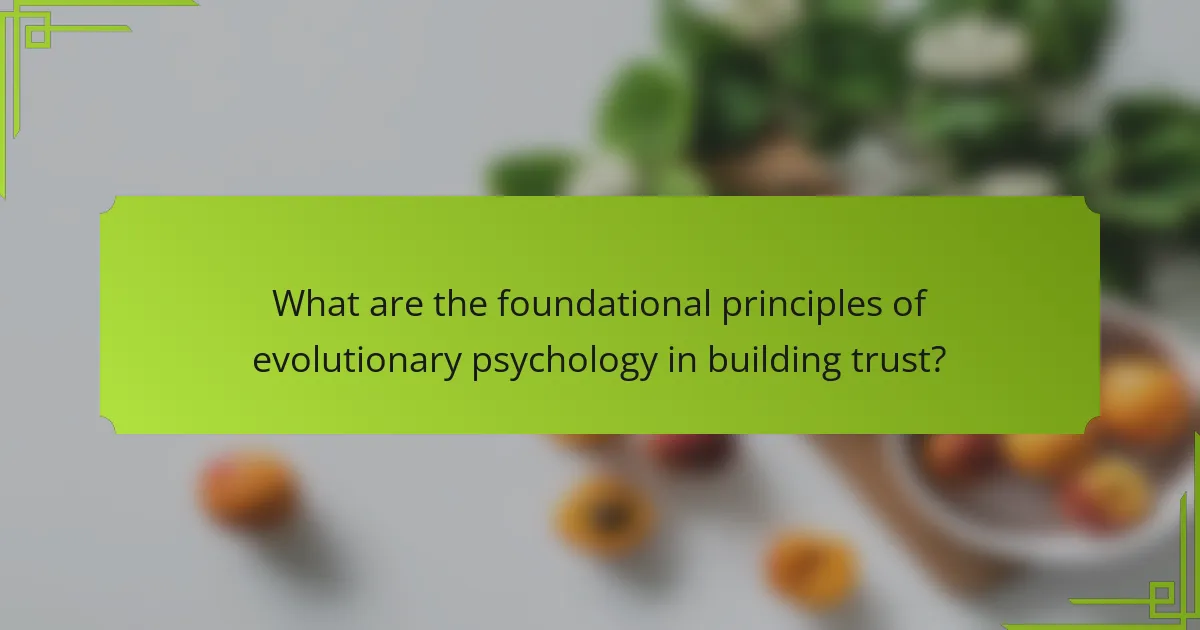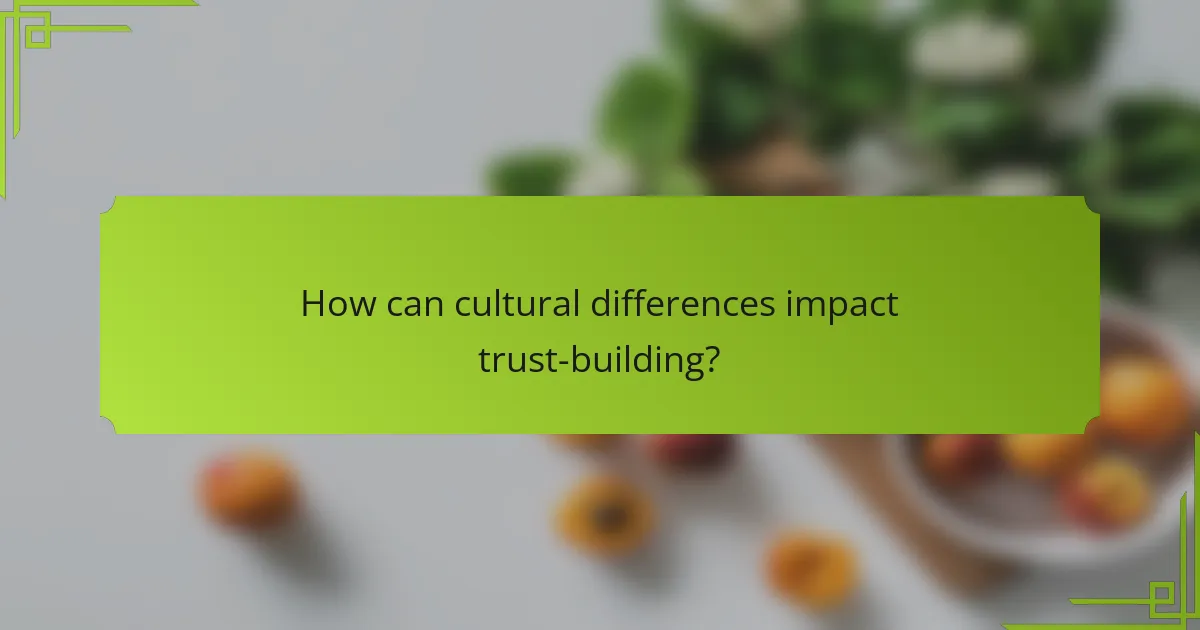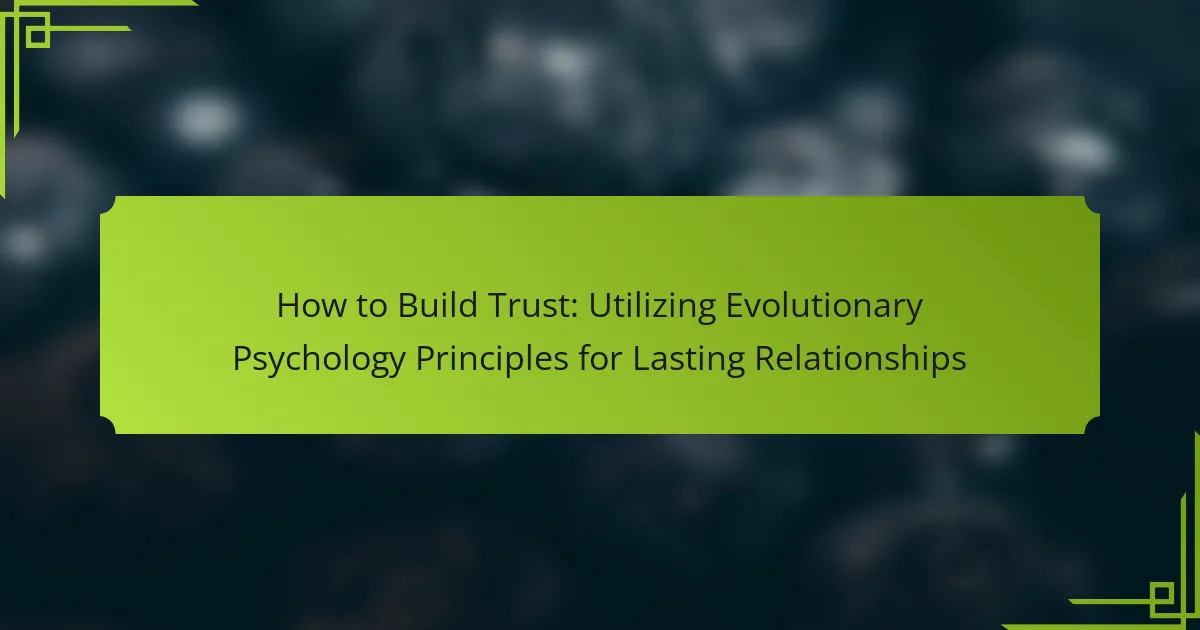Building trust is essential for lasting relationships. This article explores how evolutionary psychology principles enhance trust through reciprocity, signaling, and shared values. It examines key attributes like consistency, communication, and empathy, as well as the impact of cultural differences on trust-building. Lastly, it highlights the importance of vulnerability and transparency in fostering deeper connections.

What are the foundational principles of evolutionary psychology in building trust?
The foundational principles of evolutionary psychology in building trust focus on innate human behaviors that foster connections. Understanding these principles enhances relationship durability. Key aspects include reciprocity, where mutual exchanges strengthen bonds, and signaling, where trustworthy behaviors indicate reliability. Additionally, shared goals and values create alignment, further solidifying trust. Overall, leveraging these principles cultivates deeper, lasting relationships.
How do evolutionary instincts influence trust in relationships?
Evolutionary instincts significantly shape trust in relationships by fostering attachment and social bonds. These instincts promote cooperation and reciprocity, essential for survival and reproduction. For example, individuals exhibiting trustworthiness are more likely to attract partners and form lasting connections. Research shows that evolutionary psychology reveals a preference for partners who display reliability and support, enhancing relationship stability. Understanding these instincts allows individuals to cultivate deeper trust and emotional intimacy in their relationships.
What role does social bonding play in establishing trust?
Social bonding is crucial for establishing trust, as it fosters emotional connections and shared experiences. These connections enhance feelings of safety and reliability, which are essential for trust development. Research indicates that social bonds trigger the release of oxytocin, a hormone linked to trust and empathy. As relationships deepen through bonding, individuals are more likely to engage in cooperative behaviors, reinforcing trust over time. Additionally, shared activities and mutual support create a foundation for trust, making relationships more resilient against challenges.
How do attachment styles affect trust-building?
Attachment styles significantly influence trust-building in relationships. Secure attachment fosters open communication, while anxious or avoidant styles can hinder trust. Secure individuals are more likely to engage in trust-building behaviors, such as sharing vulnerabilities and being reliable. In contrast, anxious individuals may seek constant reassurance, and avoidant types might withdraw, complicating trust development. Understanding these dynamics allows individuals to adapt their approaches, promoting healthier, more trusting relationships.

What universal attributes contribute to trust in relationships?
Trust in relationships is built through attributes like consistency, communication, and empathy. Consistency fosters reliability, while open communication encourages transparency. Empathy allows individuals to understand each other’s feelings, enhancing emotional connection. Together, these attributes create a foundation for lasting trust.
What common behaviors signal trustworthiness?
Consistent eye contact, active listening, and openness in communication signal trustworthiness. These behaviors demonstrate reliability and foster deeper connections. Research shows that individuals who maintain eye contact are perceived as more honest. Active listening confirms understanding and respect, while open communication encourages transparency. Together, these behaviors create a foundation for lasting relationships.
How does effective communication foster trust?
Effective communication fosters trust by promoting transparency and understanding. When individuals share thoughts clearly, it reduces misunderstandings and builds a foundation for reliability. Active listening, a key component of effective communication, allows for deeper connections and validation of feelings. As a result, individuals feel valued and respected, enhancing their trust in one another. Moreover, consistent communication over time reinforces trust by establishing predictable patterns of behavior, which aligns with principles of evolutionary psychology that emphasize the importance of social bonds for survival.
What are the psychological benefits of trust in relationships?
Trust in relationships enhances emotional security, promotes effective communication, and fosters deeper connections. It leads to increased relationship satisfaction and resilience during conflicts. Psychological studies reveal that trust reduces anxiety and promotes overall well-being, creating a supportive environment for personal growth. As a result, individuals feel valued and understood, which strengthens relational bonds.

What unique attributes can enhance trust based on evolutionary psychology?
Unique attributes that enhance trust based on evolutionary psychology include consistency, reliability, and transparency. Consistency fosters predictability in behavior, reinforcing a sense of safety. Reliability builds confidence through repeated positive interactions. Transparency involves open communication, which reduces uncertainty and promotes trustworthiness. Each of these attributes aligns with innate human tendencies to seek stability and cooperation in relationships.
How does shared history influence trust dynamics?
Shared history significantly enhances trust dynamics by fostering familiarity and shared experiences. This foundation allows individuals to predict behaviors and intentions, which is crucial for building lasting relationships. Trust is reinforced through repeated interactions, creating a sense of security. Additionally, shared history acts as a unique attribute, differentiating relationships based on the depth of mutual understanding. As a result, the more substantial the shared experiences, the stronger the trust established.
What role does vulnerability play in deepening trust?
Vulnerability significantly enhances trust by fostering openness and authenticity in relationships. Sharing personal challenges creates a deeper emotional connection, allowing individuals to relate and empathize with one another. This reciprocal sharing builds a foundation of safety, encouraging further vulnerability and strengthening the bond. Research indicates that when one person demonstrates vulnerability, it often prompts the other to respond in kind, creating a cycle of trust and intimacy.
How can reciprocity strengthen trust in relationships?
Reciprocity can significantly strengthen trust in relationships by fostering mutual respect and cooperation. When individuals engage in reciprocal actions, they create a sense of obligation and reliability. This enhances emotional bonds, as each party feels valued and understood. Research indicates that reciprocal exchanges can lead to increased satisfaction and commitment levels in relationships, reinforcing trust over time. By consistently demonstrating reciprocity, individuals can build a foundation of trust that supports long-lasting connections.

What rare attributes can be leveraged to build exceptional trust?
To build exceptional trust, leverage rare attributes such as vulnerability, consistency, and transparency. Vulnerability fosters connection by showing authenticity, while consistency reinforces reliability over time. Transparency builds trust through open communication, allowing others to feel secure in relationships.
What unique experiences can create profound trust bonds?
Unique experiences that foster profound trust bonds include shared challenges, vulnerability, and consistent support. Engaging in activities that require teamwork, such as adventure sports, cultivates reliance on each other. Vulnerability, expressed through open communication about fears or failures, deepens emotional connections. Consistent support during difficult times reinforces reliability and commitment, essential for building trust.
How do uncommon shared goals impact trust levels?
Uncommon shared goals can significantly enhance trust levels by fostering collaboration and mutual understanding. When individuals pursue unique objectives together, they create a bond through shared experiences and challenges. This process encourages open communication and vulnerability, essential components for building trust. As a result, relationships become more resilient and supportive, ultimately leading to deeper connections.
What are the effects of overcoming adversity together on trust?
Overcoming adversity together strengthens trust by fostering shared experiences and resilience. This collaborative effort creates a deeper emotional bond, as individuals rely on each other during challenging times. Research shows that facing difficulties enhances mutual understanding, leading to increased trust levels. As a result, relationships become more robust and enduring, grounded in the shared journey of overcoming obstacles.

How can cultural differences impact trust-building?
Cultural differences can significantly impact trust-building by influencing perceptions and behaviors. Understanding these differences fosters empathy and communication. For instance, collectivist cultures prioritize group harmony, while individualistic cultures value personal achievement. This divergence can affect how trust is established and maintained in relationships. Recognizing these cultural nuances enhances relational dynamics and promotes deeper connections.
What cultural norms influence trust perceptions?
Cultural norms significantly shape trust perceptions by establishing expectations for behavior and communication. For instance, collectivist cultures prioritize group harmony, fostering trust through shared experiences. In contrast, individualistic cultures emphasize personal achievement, where trust often hinges on individual reliability. Additionally, cultural values such as honesty, transparency, and reciprocity further influence how trust is built and maintained. Understanding these dynamics can enhance relationship-building strategies.
How can understanding cultural backgrounds enhance trust?
Understanding cultural backgrounds enhances trust by fostering empathy and reducing misunderstandings. Recognizing diverse values and communication styles allows individuals to connect meaningfully. This alignment creates a foundation for open dialogue, reinforcing relationships. As a result, trust is built through shared experiences and respect for differences.

What are the best practices for applying evolutionary psychology to build lasting trust?
To build lasting trust using evolutionary psychology, prioritize consistency, transparency, and shared values. Establishing reliable communication fosters a sense of safety, essential for trust development. Utilize empathetic listening to strengthen emotional bonds and demonstrate understanding. Leverage social proof by showcasing testimonials or endorsements, reinforcing credibility. Lastly, cultivate mutual respect and reciprocity to enhance relationship longevity.
What common mistakes should be avoided in trust-building?
To build trust effectively, avoid common mistakes such as inconsistency, lack of transparency, and failing to listen. Inconsistency in actions or messaging can create doubt, undermining trust. Lack of transparency prevents open communication, leading to misunderstandings. Failing to listen to others’ concerns or feedback can damage relationships and erode trust. Each of these mistakes hinders the development of lasting connections based on trust.
How can individuals optimize their approach to building trust?
Building trust involves consistent communication, empathy, and reliability. Individuals can optimize their approach by practicing active listening and demonstrating vulnerability, which fosters deeper connections. Establishing shared values enhances trustworthiness, as people tend to trust those who align with their beliefs. Regularly expressing appreciation strengthens relationships, reinforcing positive interactions.
What actionable strategies can be implemented immediately?
To build trust immediately, implement active listening, express vulnerability, and provide consistent follow-through. Active listening fosters understanding and connection. Expressing vulnerability humanizes interactions and encourages openness. Consistent follow-through reinforces reliability and commitment. These strategies leverage evolutionary psychology principles to strengthen relationships.
